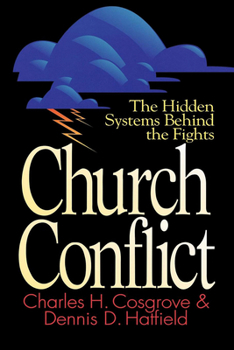Church Conflict
Select Format
Select Condition 
Book Overview
If church is like a family, it fights like one too! As in any family, conflict in the church family is natural and inevitable. But the way the church family handles its fights can make or break... This description may be from another edition of this product.
Format:Paperback
Language:English
ISBN:0687081521
ISBN13:9780687081523
Release Date:March 1994
Publisher:Abingdon Press
Length:192 Pages
Weight:0.66 lbs.
Dimensions:0.5" x 5.9" x 9.1"
Customer Reviews
1 rating
Good intro to systems theory and leadership
Published by Thriftbooks.com User , 17 years ago
Charles Cosgrove (professor of New Testament at Northern Baptist Seminary in Brookfield, Illinois) and Dennis Hatfield (former parish pastor and current Analyst/Consultant with Gallup) have produced a very well written, thorough, yet highly practical book that analyses the cause of conflict within a church while it gives pastors techniques for dealing with such conflict. The metaphor that runs throughout the book is the church as a family. Just as families have parents (those who wield authority) and children (those who look to parents for guidance and social cues) so churches also have members who fill each of these functions. Much of the analysis and advice Cosgrove and Hatfield give revolve around the systemic identification of who occupies the position of a congregational parent and who is a congregational child (as well as identifying your own role). Such systemic mapping is beneficial in both the short- and long-run. Another major theme presented by Cosgrove and Hatfield is their push to create healthier systems through fostering effective, honest communication. Much communication theory is presented in these pages, including the relationship between type of communication and various emotional bonds, triangles, affirmation, and various models of influence/leadership. There are many positive aspects of this book-many of which are previously mentioned. It is highly readable, highly practical, and thorough. The authors illustrate their theories with many examples and give helpful techniques. Also, their focus is not on immediate (urgent) conflicts, but encourages a proactive, long-term systemic involvement to improve the communication style and interrelationships within a congregation. While there are not many negatives, I do wish the authors would've addressed some related topics as I walk away with some questions. The authors thoroughly cover the parent/child relationship, but how does one become a child or a parent? How can one gain influence in a congregation? How can parents relate to one another and is this different from the way in which children relate to one another? What is to be done with "ghosts"? In the chapter on "games," how does one begin to get the congregation to stop playing a game (short of using the rules to your advantage, thus playing the game)? In all, I highly recommend this book. It is a great introduction to systems theory, congregational dynamics, and even pastoral leadership styles. If you have interest in any of these, you will do well to make a study of this highly readable book.




